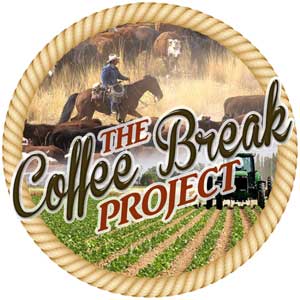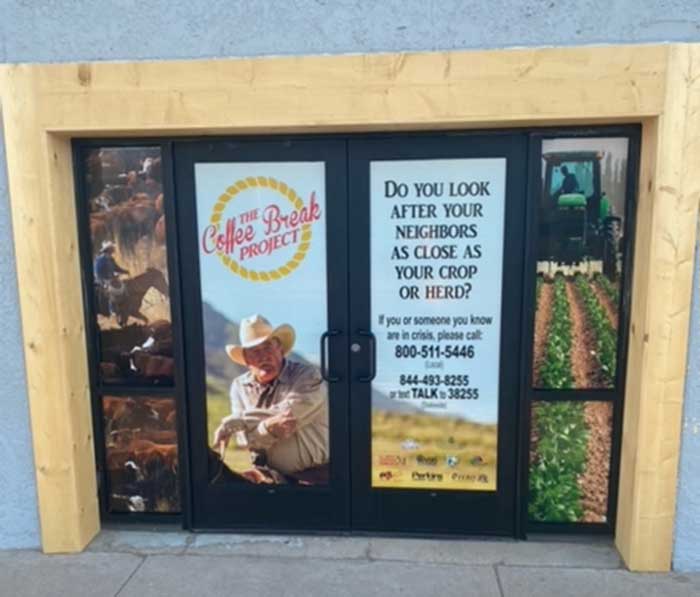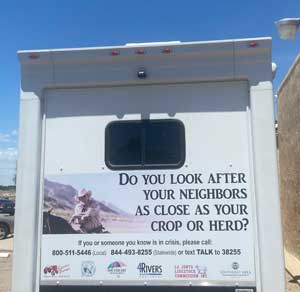The Coffee Break Project
- Need: Men in the agriculture industry face high suicide rates due to factors including long hours, geographic isolation, lack of social opportunities, and stigma surrounding mental health care.
- Intervention: The Coffee Break Project, a program led by Valley-Wide Health Systems, Inc. in southeastern Colorado, encourages mental health check-ins for farmers and ranchers through a public awareness campaign and casual coffee gatherings that utilize COMET, an intervention model developed specifically for rural communities.
- Results: Between eight and 20 people typically attend each coffee gathering.
Description
 The Coffee Break
Project is a community-driven model to support the
mental health and emotional wellbeing of farmers and
ranchers in rural eastern Colorado. The program is led by
Valley-Wide
Health Systems, Inc., in partnership with a number of
local businesses and organizations in the region, with
biweekly gatherings held in the town of Rocky Ford.
Southeast Health Group created the program in 2018 after
forming a local advisory committee to explore potential
ways to address high suicide rates among men in the
agriculture industry. The advisory committee was made up
of community members who worked in agriculture
themselves; many of the committee members had personally
known a friend or family member who died by suicide.
The Coffee Break
Project is a community-driven model to support the
mental health and emotional wellbeing of farmers and
ranchers in rural eastern Colorado. The program is led by
Valley-Wide
Health Systems, Inc., in partnership with a number of
local businesses and organizations in the region, with
biweekly gatherings held in the town of Rocky Ford.
Southeast Health Group created the program in 2018 after
forming a local advisory committee to explore potential
ways to address high suicide rates among men in the
agriculture industry. The advisory committee was made up
of community members who worked in agriculture
themselves; many of the committee members had personally
known a friend or family member who died by suicide.
With the tagline "Do you look after your neighbors as close as your crop or herd?," the Coffee Break Project encourages mental health check-ins for farmers and ranchers through a public awareness campaign and through twice-weekly gatherings featuring free coffee and donuts. These casual gatherings allow farmers and ranchers the opportunity to talk amongst themselves and check in on one another in the process. While women are welcome to participate in the Coffee Break Project's programming, the program is primarily aimed at men due to the fact that men experience higher suicide rates and tend to be less likely to seek out mental health services.
The Coffee Break Project utilizes and hosts trainings in COMET (Changing Our Mental and Emotional Trajectory), an intervention model for rural communities developed by rural community members and researchers at the High Plains Research Network. The COMET model trains community members to engage with a friend or acquaintance who may be experiencing mental health challenges using a set of simple questions and guidelines.
The program was initially funded solely by Valley-Wide Health Systems, Inc., but has since received grant funding from the U.S. Department of Agriculture (USDA) and other organizations. The Coffee Break Project has also received grant funding from the High Plains Research Network.
Partners of the Coffee Break Project include:
- 4 Rivers Equipment
- Arkansas Valley Seed
- First National Bank
- High Plains Research Network
- La Junta Livestock Commission Inc.
- Lucero Farms
- Otero College
- Perkins Chevrolet Buick GMC
- Southeast Area Extension - Colorado State University
Services offered
Coffee gatherings
Two mornings a week, the Coffee Break Project hosts casual gatherings in Rocky Ford for farmers and ranchers to meet up and chat about life and work. These gatherings, where free coffee and donuts are provided, offer participants an informal opportunity to check in on one another. All coffee gatherings are held at a building owned by the Southeast Health Group in downtown Rocky Ford.

COMET trainings
The Coffee Break Project offers COMET trainings in southeastern Colorado and has occasionally hosted trainings in other parts of the state. Some trainings are open to the general public while others are targeted toward those working in specific professions, such as first responders, hospice workers, or massage therapists.
Public awareness campaign
The Coffee Break Project began its outreach to the community by partnering with local businesses to hold monthly giveaways of items such as coolers and stadium chairs. Since then, the Project has continued to spread awareness of its services and mission through bumper stickers and a traveling display featuring the tagline "Do you look after your neighbors as close as your crop or herd?" and by driving around to distribute lunch boxes with snacks and informational materials to agriculture workers when they're on the job.

The Coffee Break Project's promotional materials prominently feature the logos of nine local and regional businesses and organizations that the Project has partnered with, most of which are likely to be familiar to farmers and ranchers in the area. These partners include a local seed distributor, the regional livestock commission, a farm in Rocky Ford, and a tractor dealership. By displaying the logos of familiar and trusted businesses and organizations, the Coffee Break Project aims to alleviate any stigma or fear that may be associated with mental health care.
Results
About eight "regulars" attend each coffee gathering, with as many as 20 people participating on any given day.
Challenges
Mental health often carries a stigma in the agriculture community, leading to a reluctance among some farmers and ranchers to talk about their own challenges and needs. From the start, the advisory committee for the Coffee Break Project acknowledged that some men may not feel comfortable participating in the coffee gatherings or other events – and that to reach these men, some outreach to their spouses or other female friends or relatives may be needed. The Project's outreach coordinator has worked to make connections in the agriculture community to reduce any stigma that may be associated with the program, and a number of women in agriculture have been trained in the COMET model.
The geography of sparsely-populated southeastern Colorado has also created challenges for the Coffee Break Project. Because the Project covers a broad swath of the state, reaching some of the more geographically isolated farmers and ranchers – including those who might live too far away to regularly attend coffee gatherings – has been difficult. Insufficient broadband access and cell phone service in some parts of the region complicates things further, making it difficult for many farmers and ranchers to access informational materials or telehealth services.
Replication
Valley-Wide Health Systems, Inc. attributes much of the Coffee Break Project's success to the ongoing involvement of its advisory committee members, who meet monthly and regularly attend outreach events for the program. The program's leadership team also sees its partnerships with local agriculture-related businesses and organizations as key to gaining the trust of the farming and ranching community.
Contact Information
Jennifer Pollmiller, Director of OutreachValley-Wide Health Systems, Inc.
The Coffee Break Project
PollimerJ@Valley-WideHealth.org
Topics
Community engagement and volunteerism
Farmers and farmworkers
Men
Mental health
Stigma
Suicide and suicide prevention
States served
Colorado
Date added
July 25, 2022
Date updated or reviewed
October 27, 2023
Suggested citation: Rural Health Information Hub, 2023. The Coffee Break Project [online]. Rural Health Information Hub. Available at: https://www.ruralhealthinfo.org/project-examples/1100 [Accessed 23 April 2024]
Please contact the models and innovations contact directly for the most complete and current information about this program. Summaries of models and innovations are provided by RHIhub for your convenience. The programs described are not endorsed by RHIhub or by the Federal Office of Rural Health Policy. Each rural community should consider whether a particular project or approach is a good match for their community’s needs and capacity. While it is sometimes possible to adapt program components to match your resources, keep in mind that changes to the program design may impact results.
